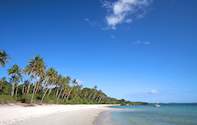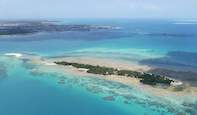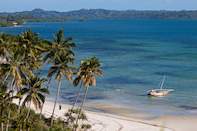
Zanzibar has many offshore islands, many of which provide a stunning location for a day trip or a longer stay. Boats to any of the islands off Zanzibar or Pemba can be hired easily from local fishermen in Stone Town, ask at the 'big tree' opposite Mercury's restaurant on the seafront, or arrange a day trip with our Destination Specialists.
Prison Island
Prison Island is one of the nearest islands to Stone Town - just fifteen minutes or so by boat. It is also known as Changuu, and its original use was as a prison for renegade slaves punished by their master, an Arab landowner. Later it was taken over as a quarantine station by the British army, and another prison was built but never used. The large house on the island was built by British general Lloyd Mathews, commander of the army of Sultan Bargash.
Today prison island is a pleasant, if somewhat unexciting, destination for a day trip, with a nature trail that runs around its circumference, a small beach and giant land tortoises, some of which are reputedly over a hundred years old, in a pen. The island has some excellent coral formations just offshore, providing a good opportunity for snorkelling, and the restaurant in Lloyd Mathews' old house sells snacks and drinks. There is an entrance fee payable only in US dollars.
Chapwani Island

A slightly more upmarket choice than Prison Island, Chapwani, or Grave island is the site of a luxury hotel, but day visitors who come to eat and drink in the bar and restaurant are permitted. Chapwani is the site of a British naval cemetery, final resting place of sailors who perished while serving in Zanzibar.
The victims of the World War One attack on the HMS Pegasus by the German warship Konigsberg are also buried here. It's interesting to wander around the graveyard and decipher the ages and causes of death of the servicemen - many died from tropical disease, or were killed in skirmishes with local slavers.
Chapwani Island also has a beautiful white, sandy beach and a small population of duikers (a type of miniature antelope), as well as some interesting birdlife.
Bawe Island
Bawe island is further away from Stone Town than Changuu or Chapwani, a good forty five minutes by motorboat, and consequently less visited. The beach is excellent at low tide, with unusual stone formations, and there is some good snorkelling to be had on the island's reef.
Chumbe Island
6 kilometres south of Stone Town, surrounded by pristine coral reef, Chumbe Island Coral Park is one of the world's newest and most successful eco-tourism projects. In 1994 the reef surrounding Chumbe island was created Tanzania's first Marine National Park. The island itself, covered with lush mangrove forest, is a designated forest reserve.
Chumbe Island Coral Park won the British Airways Tourism for Tomorrow Award in 1999, in recognition of seven years' conservation work carried out in co-operation with local fishermen, now retrained as marine wardens.
Chumbe island contains a lighthouse, built by the British in 1904 and still operational, a ruined Mosque and the lighthouse keeper's house, now converted into a spectacularly-built education centre and restaurant.
Visitors can come for the day to snorkel over the incredible coral reef, which contains over 90% of all coral species ever recorded in East Africa. The reef, declared the 'world's best shallow water coral reef' by the Australian Institute of Marine Science, is home to over 370 species of fish, turtles and dolphins. Guided walks are also available through the island's coral rag forest, interspersed with intertidal pools and huge baobab trees, which supports a unique flora and wildlife population including the rare - and enormous - coconut crab.
But to experience Chumbe Island properly, stay the night in one of the seven 'eco-bandas' that nestle in the forest. Each is a two-storey, private cottage constructed out of local materials and decorated with shells, driftwood and colourful local fabrics.
Water and energy on Chumbe are self-sustaining and provided by nature - the roofs of the bandas and the education centre have been designed to catch and filter rainwater, which is then heated by solar power. Beds are high in the palm-thatch roof, with a personal air-conditioning system that involves raising and lowering the front wall of the bedroom like a portcullis!
All profits from tourism on Chumbe Island are re-invested into the conservation and education programs operating in the Park, and the island is staffed and managed by local Zanzibaris from the fishing community, with voluntary support from overseas experts.
Pemba Island

Alternatively, leave the better-known island of Unguja behind and set sail for Pemba - smaller than its neighbour, lusher and hillier. Scarcely any tourists come here, and the beaches are unspoiled and otherworldly. At night the wind that whispers through the clove plantations which cover most of Pemba might bring the sound of distant drumming.
But don't be tempted set off toward the noise - in the 1930s Pemba was famous the world over for the power of its sorcerers and magicians, with devotees of the black arts coming from as far away as Haiti to be initiated into the rites of Pemban witchdoctors.
By all accounts Pemba is still a centre of witchcraft today, but visitors will be unlikely to see any hint of the occult. Instead you can float across spectacular coral reefs, laze on those untouched beaches and explore the winding hills and dense vegetation of the interior.
The tiny number of visitors to Pemba Island every year means that the island has little in the way of tourist infrastructure - which for alternative travellers is the main attraction. Small guesthouses are dotted around the island, and a couple of upmarket diving hotels have recently opened.
Visitors may be surprised to find that bullfighting is a popular local sport, supposedly imported by Portuguese invaders in the 17th century. The Pemban version, however, simply involves testing the skill of the bull in a series of bold moves by the matador, after which the bull is loaded with flowers and praise, and paraded around the village.
Misali Island, to the west of Pemba, is reputed to have been used as a hideout by the notorious pirate Captain Kidd, who is even said to have buried treasure here. Today a conservation program has been established, and visitors can come for the day, snorkel off the beach and walk in the forest. Locals believe the island is holy, having been used by the prophet Hidara as a prayer mat. Visitors to the island are asked to respect local customs and beliefs.

 The exclusive and private Mnemba Island Lodge, situated just 20 minutes from the Spice Islands of Zanzibar, offers guests romance, beauty a...
The exclusive and private Mnemba Island Lodge, situated just 20 minutes from the Spice Islands of Zanzibar, offers guests romance, beauty a...